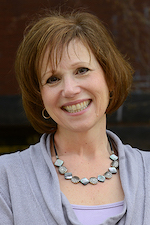Deborah Ottman, MA, oversees CEED’s online courses and self-study modules. She shares what makes our professional development special and puts her finger on a couple of ways in which adult learners differ from traditional full-time students.
What was the educational and career path that led you to your role at CEED?

Deborah Ottman: I earned a BA in communications with a minor in fine arts and Spanish from Cardinal Stritch University and an MA in communications from Marquette University in Milwaukee. After graduate school, I taught English as a second language to adult Spanish speakers in Miami, and discovered that I loved teaching adults. This experience led to a position with a professional development program at the University of Detroit Mercy, where I worked with professionals from all over the world. These were pre-internet times, so the cross-cultural learning that is now so easy for us to access really had to be achieved through direct experience. In my work, that meant anything from reading through McDonald’s employee handbooks with my students in Miami to taking them grocery shopping in Detroit! In both these positions, I appreciated the chance to gain insight into the immigrant experience.
After moving to Minnesota, I worked at the PACER Center, a nonprofit whose mission is to support children and young adults with disabilities as well as their families. I worked on a federally-funded project helping Title I schools engage authentically with families to support children’s academic success. I also worked with these families to support their skills in advocating for their children to help them be successful in school. Being a mom of three young boys myself, I had a particular interest in working with and on behalf of families with young children. Simultaneously, I started providing professional development for public school teachers and administrators, as well as creating large training events for parents.
I started working at CEED in 2012. My role here is an especially good fit because I’m able to bring together my experience in adult education, working with diverse populations, and event planning with my interest in early childhood.
What do you think sets apart CEED’s professional development opportunities? Why should people choose our courses, modules, or trainings?
There are several things that set us apart. First, we are housed within the Institute of Child Development, a remarkable academic department within a Research I university. Our online courses and our self-study modules present high-quality content that is grounded in evidence. Our instructors and module authors are real-world professionals working in the fields they teach. We also offer training, both in-person and online, in research-based classroom assessment tools such as the Classroom Assessment Scoring System (CLASS®), Desired Results Developmental Profile (2015), and COR Advantage. The academic rigor that we bring to adult education is really important.
Also, CEED is cross-disciplinary. Our work is grounded in the study of infant and early childhood mental health—another way of talking about social and emotional development. This means, for example, that we look not just at children’s behaviors, but at what those behaviors may be communicating. As another example, we recognize that children don’t develop in isolation; they develop in the context of their caregiving environment and culture. So we take a “two generation” approach to working with families; our participants build skills and knowledge to support children by supporting the important adults in those children’s lives. Additionally, CEED is home to the Reflective Practice Center (RPC). Using a reflective approach helps practitioners work more effectively with children and families and even with their colleagues. With a research center devoted to reflective practice here at CEED, we naturally incorporate reflective principles into our professional development.

We offer all of this research-based content wrapped up in formats that are based on best practices for adult learning. Our goal is to make things easy for people who work hard all day—teachers, social workers, health care workers, administrators, and many others. These are professionals whose main job is not to be a student. Their main job is to work with children and families.
How do working professionals’ educational needs differ from those of full-time students?
One of the more profound starting differences is that full-time students don’t have as much autonomy in choosing what they are going to learn. One thing that we know about adult learners is that they need to know “what’s in it for me.” That’s the starting point. They need to see and feel that what they’re learning can be applied to their job.
Another difference between a traditional student and an adult learner is that the older we get, the fuller our lives become. We have many demands on us: jobs, families, volunteer pursuits, even interests and hobbies. We can’t meet in a classroom three times a week during the middle of the day for an hour and a half. Professional development needs to be accessible and flexible. That’s where virtual learning environments provide great opportunities.
I mentioned earlier that in the pre-internet age, it was more difficult to come by cross-cultural experiences. The advent of the internet has also opened up new possibilities for professional development. You can access our online courses and modules from anywhere, at any time. I find it inspiring that we are able to meet learners where they are—both geographically and in terms of their level of knowledge and skill.
What are some of the ways in which you’ve continued to adapt the professional development options at CEED in response to learners’ needs?

In 2021, we offered our annual Minnesota Early Intervention Summer Institute as a virtual event for the very first time. We were able to provide two days of intensive, innovative professional development to more than 200 early childhood practitioners from Minnesota and beyond. People who normally would not be able to travel to this event, including people from outside our region, were able to participate. Again, we’re really fortunate to be housed within the University of Minnesota, which allows us to access both the best that technology has to offer and also skilled support staff who are experts on using that technology.
Another big change to our professional development offerings is our latest addition–our self-study modules. These explore reflective topics in ways that work for people who are just beginning their reflective journey as well as for those with a more extensive background in reflective practice. I like to recommend Wondering with purpose: reflection in any setting as a starting point for people who don’t have prior knowledge of reflective practice.
The modules take around three hours to complete, but if a participant can only spend half an hour at a time on the module, that’s okay. The modules are structured so they can pick up where they left off later. We give participants access to the module for a whole year. They can take their time, revisit content, and make sure that they get what they hoped to gain out of it.
Going back to adult learning theory, this is a difference between adult learners and traditional students. Adults are going to choose what they want to learn. In our professional development offerings, we give them the basics of what we feel they must know so that we can say, “Yes, you’ve learned this content to a baseline level of satisfaction.” However, when professionals choose to call upon what they learned, it’s entirely up to them how they do that.
What are some of your hobbies and interests outside of work?
I’m in a book club that has been going strong for 20 years! Right now, we’re reading The Power by Naomi Alderman, which was on President Obama’s reading list a few years back.

I’m also a pretty big-time gardener. I have a vegetable garden, trees and shrubs, and perennial beds. This year, my shade garden is doing well with a native cardinal flower that’s a magnet for hummingbirds as well as some new coral bells and a beautiful plot of jack-in-the-pulpit. I’ve been working on incorporating plants that are native to Minnesota and don’t require a lot of extra water or other resources. These plants also sustain our native insects and birds. It’s fun to see a plant vibrating because there are so many honey bees on it. One thing I love about gardening is that it connects us to nature’s life cycle in such an elemental way. It doesn’t really matter what you’re raising or the size of the plot that you tend–gardening is an inherently hopeful activity.
Related subjects
Tags: early childhood education, infant and early childhood mental health, professional development, reflective practice, staff and faculty

